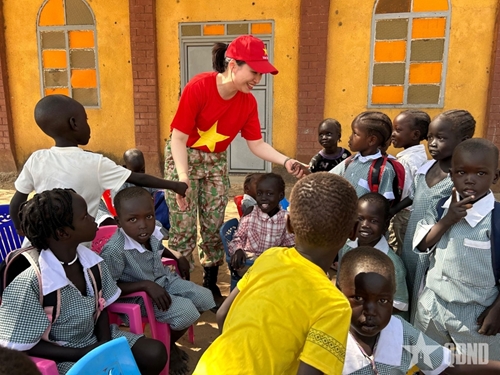In March 2025, she received the decision to undertake her mission with UNISFA, a region still suffering the consequences of ethnic conflict, harsh weather, and complex epidemics. Despite the difficulties, she has wholeheartedly strived to fulfill all assigned tasks.
    |
 |
|
Major Le Thi Phuong Dung performs her tasks at UNISFA. |
Sharing her experience during a patrol, Major Dung recounted an April morning when Abyei had just entered the early rainy season. Though rains typically begin in late May, that year they arrived early. Fully equipped with body armor, helmet, and communication devices, she and her team at the Banton Military Observation Site gathered in preparation for a long patrol.
She was handed an old notebook, with several pages still stained with mud. Before setting out, the team leader checked communication systems, coordinated with UNISFA headquarters, assigned duties, and conducted final briefings. His professionalism helped calm her nerves, as it was her very first patrol. She paid close attention and took detailed notes, knowing she would eventually rotate into the team leader role herself.
    |
 |
|
Major Le Thi Phuong Dung (second from left) discusses with her colleagues before conducting patrol. |
For that day's patrol, she was assigned to collect data and draft the mission report. As the only female member and a newcomer, she received strong support and encouragement from the team. One female officer handed her a piece of candy and kindly said, “Keep this, Dung; it might come in handy later.”
Their vehicle, a Nissan Patrol, set off on a long route through several villages. The objective was to verify reports from locals about livestock theft and armed threats posed by rebel groups. She recalled lessons from her pre-deployment training in Vietnam, where instructors had emphasized that military observers are the “eyes and ears” of the mission — those who enter conflict zones, engage with civilians, gather intelligence, and help ensure protection under the U.N. Security Council’s mandate.
    |
 |
|
Major Le Thi Phuong Dung implements mass mobilization work in the area. |
Throughout the patrol, the team visited many villages, spoke with residents, and gathered information. One thin, barefoot farmer described how locals were frequently robbed of their cattle, attacked, and even received death threats. According to him, the community lived in poor conditions, with no factories, no arable land, and depended entirely on livestock grazing and foraging from the forest.
Before her deployment, Dung had heard stories like these, but she could not have imagined the stark reality of life in such areas. Born and raised in peacetime Hanoi, her understanding of war had come only from books, documentaries, and her father’s stories.
Now, witnessing life in Abyei, a land still gripped by instability, she said she had come to deeply appreciate the true value of peace and independence. She felt even more grateful to the generations of Vietnamese who had sacrificed for their country’s freedom. She also expressed her determination to continue working closely with international colleagues and contribute to the mission’s success, in order to uphold the shared dream of peace, security, and a better life for the people of Abyei.
Translated by Minh Anh